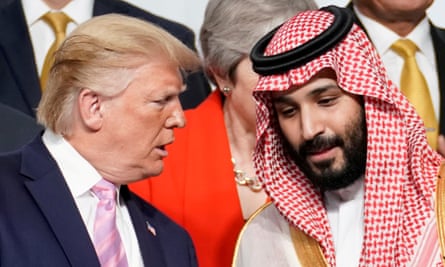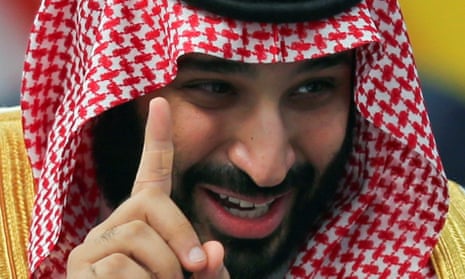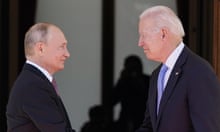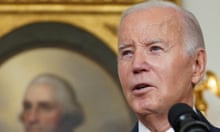In late 2019, as Joe Biden stood on a debate stage and boldly vowed to make Saudi Arabia a pariah if he was elected president, a little-known former aide and Middle East expert was examining what exactly a “progressive” post-Trump stance towards the oil-rich kingdom might look like.
Daniel Benaim, a policy wonk who had worked for Biden as a speechwriter, and for Hillary Clinton and John Kerry before that, first travelled to Saudi Arabia and then began interviewing dozens of Democratic and progressive policy experts to come up with a blueprint.
The experts – former US diplomats, political appointees, academics and activists – were divided on a single question: was the US relationship with Saudi Arabia and its young and obviously rash, murderous and unstable de facto ruler, Mohammed bin Salman, worth salvaging?
For so-called “rethinkers”, as Benaim called them, the answer was no, the partnership with Saudi Arabia was unreliable, unpalatable, outdated and overrated. The “resetters”, on the other hand, believed there was enduring value in the relationship but that it needed some “tough love”.
As the Biden administration prepared last week to release a long-awaited report on the murder of the Washington Post journalist Jamal Khashoggi, dissidents, activists and some members of Congress hoped the new US president would deliver a response true to his “pariah” campaign promise.
Some rethinkers believed intense pressure from Riyadh’s most important ally – targeted directly at the man whom intelligence agencies concluded was complicit in the killing – might even lead to Prince Mohammed’s removal from the royal line of succession.

Biden instead endorsed a policy of “recalibration” but “not rupture”, the precise words Benaim – now one of the state department’s most senior Middle East advisers – had used in his own analysis and policy recommendations.
After the Trump years, in which the former administration ignored grave human rights abuses, the White House’s decision to release the report by the Office of the Director of National Intelligence (ODNI) on the Khashoggi murder was hailed for its transparency, as was Biden’s decision to personally shun Prince Mohammed and call for an end to the kingdom’s war in Yemen.
But the move to forego targeted sanctions against the prince was also met with dismay in many circles, including in the halls of Congress where distaste for the crown prince is one of few issues on which Democrats and Republicans can find common ground.
A Washington Post editorial acknowledged that Biden was at least ending Donald Trump’s “grotesque and unprecedented coddling” of Saudi Arabia, but said he was “nevertheless granting what amounts to a pass to a ruler who has sown instability around the Middle East in recent years while presiding over the most severe repression of dissent in modern Saudi history”.

Ned Price, the state department spokesperson, defended the administration’s actions. “This administration sent a frank message to Saudi leaders,” he said at a press conference early this week. “We seek a partnership that reflects our important work together and our shared interests and priorities, but also one conducted with greater transparency, responsibility and accord with America’s values.”
He said the US would not “ignore or minimise egregious misconduct”, but the relationship was nevertheless important to US interests.
Beniam’s June 2020 report for the Century Foundation, which appears to have influenced decision making, offered additional clues about the issues that may have guided the administration’s thinking, including the enduring importance of oil and counter-terrorism cooperation.
Beniam noted that some experts believed it was dangerous to underrate the importance of Saudi internal stability, and that the “consequences of Prince Mohammed’s downfall for the United States could be worse than the Iranian Revolution of 1979”. Despite their differences, Washington’s relationship with Riyadh also stood in sharp contrast to that with Tehran and its “foundational anti-Americanism”, others said.
Unnamed officials describing the Biden administration’s internal deliberations to the Washington Post said a public ban against the grandson of the founder of Saudi Arabia was seen as akin to declaring a hostile relationship with the kingdom, the protector of the world’s holiest Muslim sites. Freezing Prince Mohammed’s assets, another idea critics floated, was seen as virtually impossible.
Members of Congress have nevertheless expressed frustration. “I don’t think this story is over, by far,” said Bruce Riedel, a former longtime CIA analyst on Saudi Arabia and one of the world’s pre-eminent experts on the kingdom’s royal family. “What I can say with confidence is that the controversy is far from over, it will continue in the public domain, in the media, and on the Hill. The administration is going to have a tough time convincing people that this was enough.”
Legislative proposals are already in the works in Congress to target Prince Mohammed. Robert Menendez, the Democratic chair of the Senate foreign relations committee, has raised the possibility of sanctioning the crown prince through the global Magnitsky Act, which targets officials for violating human rights, and said it was important that he faced “real consequences”.
If Congress did decide to take action against the prince without Biden’s explicit support, it would not be the first time lawmakers have outmanoeuvred a president on a Saudi-related issue. At the end of the Obama administration, Congress overrode a presidential veto and passed a law that limited Saudi Arabia’s sovereign immunity from lawsuits brought by the families of victims of the 11 September 2001 attacks.
Riedel noted that Prince Mohammed was under intense pressure at home, leading a costly war that Saudi Arabia was losing in Yemen and facing threats from domestic enemies after alienating members of the royal family, including those “he shook down” as part of a so-called anti-corruption crackdown at the Ritz-Carlton.

Asked whether it was now effectively too late to believe that the prince could be stopped from becoming king, he said: “No. He has a lot of enemies in Saudi Arabia. If the objective of the United States is a stable, moderate Saudi Arabia that is stable internally and not a source of unrest in the region, then that Saudi Arabia has no place for Mohammed bin Salman. We know that, we’ve seen years of it now.”
Riedel and others have also pointed to contradictions in the White House’s policy that will become difficult to navigate. It has said Biden will only deal with his counterpart King Salman, but his son could in theory become king at any moment.
When the White House sought to defend its decision to stop short of sanctioning the prince directly, it pointed to historical precedence in that foreign heads of state were not usually subjected to such measures. That contradicted earlier statements that argued he was not, in fact, the head of state.
“That’s why I think parts of this policy were not very well thought through. It is clear to me that they did not anticipate the amount of criticism. They are still trying to make their case and not having a lot of success,” Riedel said.
Seth Binder, of the Project on Middle Eastern Diplomacy, said the US had sought to send a message that Biden was releasing the report to follow the law, because it had been mandated by Congress, but that it had ultimately shown that Prince Mohammed, sometimes referred to as MBS, could not be punished because he was above the law.
“I also don’t think the administration has explained why we cannot sanction him and [also] not rupture the relationship,” Binder said. “The US could still engage with security officials and other diplomats as we need to, without excusing MBS.”
There was also a mysterious decision involving the removal of the names of three Saudis listed as complicit in the Khashoggi murder in the ODNI report.
On Capitol Hill, the New Jersey Democratic congressman Andy Kim, who previously served as a national security adviser to Barack Obama, launched some of the toughest critiques against the administration, saying the lack of action against Prince Mohammed sent “a clear message across the globe that those at the top can escape consequences”.
In an interview with the Guardian, Kim, who is a member of the House foreign affairs committee, said it was not his intention to try to force Biden’s hand or change the Saudi line of succession. “It’s about trying to align the actions in terms of where things truly are in the relationship between US and Saudi Arabia. I just feel we are often not looking at that relationship with honest eyes,” he said.
“What we’re trying to decide right now is next steps. The actions MBS took two years ago pushed our relationship to this brink. It is MBS who has endangered our relationship and therefore he has the responsibility to take the actions to try to repair them. What is he going to do, what is he going to bring to the table?”
For Kim and other lawmakers, the issue is not just about winning justice for Khashoggi, but also envisioning what the US relationship looks like after a future “King MBS” has been in charge for decades.
“An alliance isn’t just an alliance for its own sake, it tries to serve some type of strategic objective and purpose,” he said.
That view was echoed by Abdullah Alaoudh, a Saudi academic and activist based in Washington whose father, a high-profile pro-reform cleric, is facing the death penalty in a Saudi prison.
“There are people who say ‘let’s be realists’. Well OK, let’s be realists. Let’s talk about stability. This guy has waged war in the south of Saudi Arabia and created the worst humanitarian crisis that is not only a stain on Saudi Arabia but also on the US, on everybody who helped the Saudis wage this war. It’s still ongoing,” he said.
“Imagine he is now only a crown prince. Imagine he would rule for the next 40 years and be a king. What would he do?”
The three most influential alternatives to Prince Mohammed, he added, were now all in detention: Mohammed bin Nayef, the former crown prince and a close US ally, Prince Ahmed bin Abdul Aziz Al Saud, the only surviving full brother of King Salman, and Turki bin Abdullah, the son of the late King Abdullah.
“If MBS was not just pressured but forced to release them from jail, and if they were protected by the international community, I think the royal family will have the chance, once and for all, to decide who is their crown prince and their next king,” Alaoudh said.










